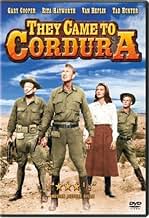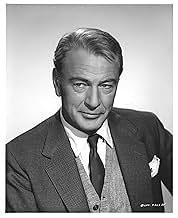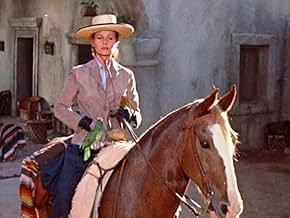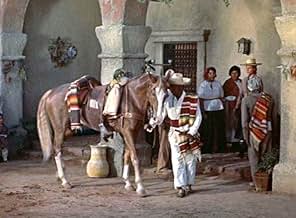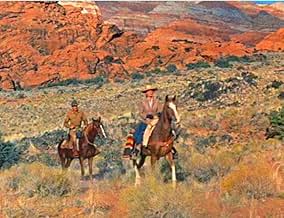Adicionar um enredo no seu idiomaAn army major, himself guilty of cowardice, is asked to recommend soldiers for the Congressional Medal of Honor during the Mexican Border Incursion of 1916.An army major, himself guilty of cowardice, is asked to recommend soldiers for the Congressional Medal of Honor during the Mexican Border Incursion of 1916.An army major, himself guilty of cowardice, is asked to recommend soldiers for the Congressional Medal of Honor during the Mexican Border Incursion of 1916.
- Direção
- Roteiristas
- Artistas
- Prêmios
- 1 vitória e 1 indicação no total
- Capt. Paltz
- (as James Bannon)
- Cavalry Trooper
- (não creditado)
- Direção
- Roteiristas
- Elenco e equipe completos
- Produção, bilheteria e muito mais no IMDbPro
Avaliações em destaque
Also, confidence in people can change them and reform them.
The acting is superb throughout, and Gary Cooper captures wonderfully the gradual decline as he leads his motley crew on a trek to survival through the desert. An heroic performance to match the hero he portrays.
This is movie that deserves more acclaim than it has received.
In my book this is a must see. Great fare for Sunday afternoon on the couch!
What is courage? What is cowardice? This is the story of his search for an answer.
That summary is the opening text from this oddly {to me} divisive picture from Robert Rossen and Ivan Moffat. Divisive because there are conflicts about it's technical aspects, its length {which cut is original?}, it's talky nature, and if it's splendid cast did the material justice? Well the dispute about the technical aspects being poor certainly don't stand up to the version I saw of the picture, lovely widescreen CinemaScope with Burnett Guffey's photography astutely and rightly oppressive as the story unfolds. As for its length, the version I viewed was two hours long, is this a restored cut or is there still another half hour of Rossen footage lurking somewhere? Either way, the complaint about there being gaps in the film are not evident in this two hour cut. All characters are fully fleshed and every minute of this picture was engrossing and perpetually watchable. The cast are also on fine form, Gary Cooper is perfectly cast as Maj. Thomas Thorn, the man who's moment of weakness hangs heavy round his neck like a curse. Van Heflin, Rita Hayworth, Dick York, Richard Conte and Tab Hunter all help to make this a fine character driven piece.
Above all else it's the story that works the best, Thorn is carrying around a burden as he strives to take these heroes to safety and ensure they receive their medals of honour. But the perilous journey proves to alter each man's attributes, be it despicable or otherwise, something that to me personally makes this a thematically excellent picture, the kind we could do with more of in the modern era. It may well be cynical at times, but really that is no bad thing in my eyes, it's a cop out of sorts I know, but this film isn't for everyone. After a fine battle sequence has been and gone, the film shifts in tone and becomes a picture about the complexities of man and his own personal hang ups, the result of which left me very much rewarded. 8/10
In 1916, while World War I was occupying most people's attention, President Wilson was concerned with the continuous unsettled state of Mexico, then in the sixth year of it's Revolution. Initially he was delighted with the first head of the Revolution, Francisco Madero, who was trying to make the country a nation ruled by constitutional law. But in 1913, Madero was overthrown and murdered by the head of the Mexican army, General Huerta. Huerta had support by the then Ambassador to Mexico, a gentleman named Henry Wilson (no relation to the then President-elect), who openly cooperated in the assassination. After Woodrow Wilson was inaugurated, he replaced Henry, but the damage was done to Mexican-American relations. The new President was too ham handed to improve matters. In 1914 he had the Marines land at Vera Cruz after our flag had been insulted. Many lives were lost in this battle. Wilson worked to force Huerta out of his office. This brought him into considering someone to replace Huerta.
Why a puritanical prude like Woodrow Wilson thought of supporting Francisco "Pancho" Villa as the corrective to Huerta has never been adequately explained. Although the two men never met, it is inconceivable that Wilson would have found the hard drinking, bloody minded, and woman chasing Pancho as an ideal type to run Mexico. But he did, and for a year or so (until Huerta left Mexico) Villa was given arms and supplies from the U.S. This honeymoon lasted until a new figure arose - General Venusiano Carranza. Carranza (like Madero) wanted the adoption of a permanent national constitution to run the country. Wilson liked this (he did not notice that Carranza did not hesitate to feather his own nest while stressing the constitution. So in 1916 Wilson began aiding Carranza, and slowly ceased assisting Villa.
Villa was angered by this, and decided to teach the gringos a lesson. He raided the town of Columbus, New Mexico, killing about a dozen citizens. It was the first foreign invasion of American soil since the War of 1812, and would be the only invasion of the continental territory of the U.S. between 1814 and 09/11/2001. Wilson was furious, and demanded that President Carranza arrest the bandit/revolutionary. Wilson might as well have demanded that Carranza arrest the winds of Mexico. He had fought several battle against Villa, and knew that Pancho was no pushover. When Carranza gave some half-baked reason for not catching Pancho, Wilson decided to take the matter into his own hands: he sent troops into Mexico under General John J. Pershing to catch the bandit revolutionary. For a year or so Pershing tried to catch Villa, but the wily Pancho managed to keep escaping. Finally the U.S. troops were called back. Mexicans were incensed at American arrogance in invading their country (sound familiar?). The only good thing was that it enabled us to test our army out here, under if's future Expeditionary Commander's leadership, before we went into the European conflict.
Except, possibly, "The Three Amigos", this is the only commercially made film that is set in the Anti - Villa expedition of 1916 - 1917. As such it barely touches the reasons for the expedition. Instead it concentrates on Gary Cooper's assignment to find five men who should receive the U.S. Medal of Honor for gallantry and bravery in action. It is a cynical act by Washington, because 1) the purpose is public relations cosmetics for a botched armed intervention; and 2) Cooper's Major Thorn is actually given the assignment because he acted cowardly on the field of battle. For the Major to be given this quiet assignment is actual an insult - his own courage is being questioned.
Soon he finds a battle going on and picks out his five men (Van Heflin, Richard Conte, Michael Callan, Tab Hunter, and Dick York). This gives him some problems with an old friend, Robert Keith, who planned the attack, and hoped it would lead to him getting the award (actually, Cooper was only impressed at how slapdash and badly planned the attack was, and cannot think of it's architect getting any type of award as a result). Keith ends his friendship with Cooper as a result.
Taking his five men with him, Cooper starts trying to get to know them. He soon discovers that the men are not interested in the medal, and (as they have a long trek to Cordura, where they have to go to finalize the awards), Cooper learns that the men are not very noble at all. To worsen things, they capture a hacienda owner who is American (Rita Hayworth), who gave assistance to Villa's men. The woman reawakens sexual tensions and rivalries between the five men, as well as Cooper.
The film ends with Cooper and the men coming to turns (after several nearly deadly confrontations) with their own views of the values of true courage and it's being honored. It is not a dull matter, but one questions a full two hour about it. Because of the covering of this dismal incident of the diplomatic history of the U.S. and Mexico, and the acting (all the leads are good), and Rossen's direction - it is worth a "7" out of "10".
After contact with the enemy, and after losing many men, five men were nominated for the Medal of Honor. Since the army needed living heroes to prepare the nation for its likely entry into WWI, Major Thomas Thorn (Gary Cooper), an awards officer, escorts the nominees, Lt. William Fowler (Tab Hunter), Sgt. John Chawk (Van Heflin), Cpl. Milo Trubee (Richard Conte), Pvt. Andrew Hetherington (Michael Callan), and Pvt. Renziehausen (Dick York), back to headquarters. This film is the story of that journey, and Thorn's exploration of the character of heroes.
Adelaide Geary (Rita Hayworth), an American woman who owns the ranch where the battle was fought, is sent back with them on charge of treason for aiding Villistas against American soldiers, even though she had no choice.
Although Hayworth and Cooper both gave impressive performances, Van Heflin was the standout as a brutish sergeant, especially since he was acting against type, having played decent men forced into heroism during his best-known films, Shane (1953) and 3:10 to Yuma (1957).
Você sabia?
- CuriosidadesAlthough Gary Cooper was 57, his character Major Thorn was forty years old according to the novel. Early in the film it is mentioned that Thorn's father had recently been killed while still on active service.
- Erros de gravaçãoMajor Thorn improperly salutes Colonel DeRose in the opening scene when he is dismissed. He should have saluted and held his salute until it was acknowledged. Instead, he lowers his arm even before Colonel Rose acknowledges it.
- Citações
Major Thomas Thorn: Did you ever see the Medal of Honor?
Private Renziehausen: No, Sir.
Major Thomas Thorn: It's the most beautiful decoration of all, as it should be. I'd trade an ear for one any time, two in fact.
Private Renziehausen: Excuse me, Sir, but I'd rather have the ear.
- Cenas durante ou pós-créditosOpening credits prologue:
On the night of March 8th, 1916, a large mounted force of Mexican rebels under Pancho Villa crossed the American Border and attacked the town of Columbus, New Mexico, killing and wounding both American civilians and soldiers.
As a result of this action,the United States Army sent an expedition into Mexico with orders to capture Villa and disperse his forces.
It was during this campaign that one man, an United States Army officer,was forced to come face to face with two of the great fundamental questions that affect mankind:
What Is Courage? What Is Cowardice?
This is the story of his search for an answer.
- ConexõesFeatured in Stars of the Silver Screen: Rita Hayworth (2011)
Principais escolhas
- How long is They Came to Cordura?Fornecido pela Alexa
Detalhes
Bilheteria
- Orçamento
- US$ 4.000.000 (estimativa)
- Tempo de duração2 horas 3 minutos
- Cor
- Proporção
- 2.35 : 1
Contribua para esta página




